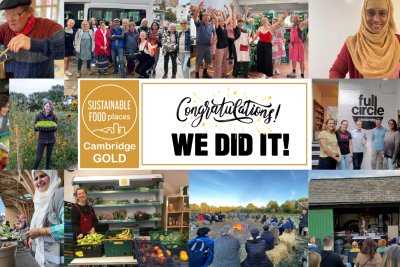News • Sustainable Food Places
30 UK cities call for government action on food poverty and warn that food banks are not the solution
30 towns, cities, boroughs and counties – representing more than 18 million citizens – have signed a declaration calling on Government to address the policy failures that have led to surging numbers of Britons going hungry. The cities warn that local councils cannot solve root causes of food poverty without action from Government to address low wages and problems with the social safety net.
- 30 cities, all members of the Sustainable Food Cities Network - including London, Cardiff, Belfast and Edinburgh - call for urgent action on food poverty by Government.
- Trussell Trust, the UK’s largest food bank network, and FareShare, the UK’s largest food redistribution charity, warn that voluntary efforts cannot replace a strong social safety net.
- Cities are allocating scarce resources to stop gap measures, such as food banks and other schemes to feed hungry people, while the number of people in food poverty grows year on year.
30 towns, cities, boroughs and counties – representing more than 18 million citizens – have signed a declaration calling on Government to address the policy failures that have led to surging numbers of Britons going hungry.
‘All citizens should have access to good food as a matter of course, not as a result of charity. Strategies that create good jobs, prepare children to learn, and ensure access to healthy food for all are needed to reverse rising tide of hunger in Britain,' said Rosie Boycott, Chair of the London Food Board.
Britain could cut food bank use in half by fixing problems with the operation of the benefits system and making sure that work pays enough to meet basic needs.[i],[ii]
- Last year, almost 100,000 children in the UK went hungry because their parents’ benefits were stopped or cut, sometimes simply because their parents were late for an appointment at the Jobcentre.[iii]
- Nearly a quarter of food bank users are employed in low wage jobs[iv], which cost UK taxpayers an estimated £11 billion per year.[v]
Whilst cities are funding community meals, school breakfast and holiday hunger schemes to help the most vulnerable ward off hunger, they are also currently allocating scarce resources to stop gap measures, including £3m of public money to support food banks[vi] and more than £43 million every year to provide food and other support to children in poverty.[vii]
"We believe the Government is wrong to push responsibility for tackling food poverty back to local councils and charity efforts when the core reasons for why people need to use food banks is because of central Government decisions, the failings of the DWP and the inability to make work pay. We have taken the lead on this issue here in Edinburgh and I am pleased now to welcome this joint declaration from 30 cities across the UK," said Edinburgh Council Leader Andrew Burns.
The food poverty crisis will deepen without concerted action to address the root causes of food poverty. The UK now trails Portugal, Cyprus and Ireland, with more than 5.5 million Britons considered food insecure.[viii] This data confirms that food bank visits – which topped 1 million this year[ix] – are just the tip of the iceberg of food poverty in the UK. A leaked internal memo shows that the Government’s plans to lower the benefit cap will plunge 40,000 more children below the poverty line.[x] Westminster must adopt policies that address the root causes of food poverty.
Ends
For press enquiries please contact Hannah Laurison, Sustainable Food Cities Campaign Coordinator at hannah@sustainweb.org or 07 454 151229.
Notes
1. The Sustainable Food Cities network is an alliance of public, private and third sector organisations using food as a vehicle for positive change. The Network helps people and places to share challenges, explore practical solutions and develop best practice in all aspects of healthy and sustainable food. It is coordinated by Food Matters, Soil Association and Sustain, and is funded by the Esmee Fairbairn Foundation. Sustainable Food Cities programmes take a cross sector partnership approach across six key areas:
- Promoting healthy and sustainable food to the public
- Tackling food poverty, diet-related ill health and access to affordable healthy food
- Building community food knowledge, skills, resources and projects
- Promoting a vibrant and diverse sustainable food economy
- Transforming catering and food procurement
- Reducing waste and the ecological footprint of the food system
For more information about Sustainable Food Cities visitwww.sustainablefoodcities.org or on Twitter follow: @foodcities
Through the Beyond the Food Bank campaign, the Sustainable Food Cities Network champions strategies that address the root causes of food poverty, reverse demand for emergency food assistance, provide a publicly-funded safety net for the most vulnerable and ensure that low-income households can afford and access good food.
2. Text of the Sustainable Food Cities Network - Call for Government Action on Food Poverty
The Sustainable Food Cities food poverty declaration was inspired by the joint statement on Food Poverty from the leaders of Glasgow City Council and City of Edinburgh Council released in March, 2015.
With more than one million adults and children forced to rely on food banks in the UK every year and millions more unable to afford an adequate, nutritious diet, food poverty has become one of the greatest challenges facing our society.
Food banks are a crisis response to the immediate needs of people who are hungry, but they are not a solution to food poverty. Experience elsewhere clearly shows that when food banks become too well established they legitimize charity as a response to food poverty and undermine fundamental rights enshrined in our welfare system. This must not happen.
The causes of food poverty are complex, but ultimately it is the result of poverty and the growing income inequality between rich and poor. Today, most of those living in poverty are in employment, a consequence of reduced wages and a proliferation of exploitative, zero-hours contracts. Many are unable to find work at all. Changes to the benefit system, including an increased use of sanctions, delays in processing claims and low benefit levels have removed an essential safety net for poorer households.
The members of the Sustainable Food Cities Network believe that access to good food is a basic human right. We call for urgent action to reduce benefit delays, review how benefits sanctions and welfare reforms are being implemented, and eliminate unnecessary hardship, hunger and distress.
We believe that programmes such as Healthy Start Vouchers, Free School Meals and Meals on Wheels must be safeguarded and extended to reach all those who are eligible. We believe local and national governments must adopt policies that ensure work is a pathway out of poverty and increase access to healthy, affordable food through local enterprise and community initiatives.
We pledge to work with those affected by food poverty and those in a position to end it – from Westminster to local government – to ensure that all citizens have access to good food as a matter of course, not as a result of charity.
Cities signing the Call for Government Action on Food Poverty:
Belfast
Bridport
Bristol
Bournemouth and Poole
Brighton & Hove
Cambridge
Cardiff
Carlisle
Durham
Edinburgh
Exeter
Glasgow
Greenwich
Hackney
Hull
Kirklees
Lambeth
Lancashire
Lancaster
Liverpool
London
Greater Manchester
Middlesbrough
Newcastle
Oxford
Peterborough
Plymouth
Portsmouth
Stockport
West Sussex
National organisations, including Alexandra Rose Charities, FareShare, First Steps Nutrition Trust, Food Matters, the Food for Life Partnership, the Soil Association, Sustain: The alliance for better food and farming, The Trussell Trust, join the Sustainable Food Cities members and more than 350 organisations and individuals calling for national action.
Footnotes
[i] http://policy-practice.oxfam.org.uk/publications/emergency-use-only-understanding-and-reducing-the-use-of-food-banks-in-the-uk-335731
[ii] http://www.trusselltrust.org/resources/documents/Press/Trussell-Trust-foodbank-use-tops-one-million.pdf
[iii] http://www.church-poverty.org.uk/rethinksanctions/report
[iv] http://www.trusselltrust.org/resources/documents/Press/Trussell-Trust-foodbank-use-tops-one-million.pdf
[v] http://www.citizensuk.org/taxpayer
[vi] http://www.bbc.co.uk/news/uk-26369558
[vii] http://touchstoneblog.org.uk/2015/05/schools-and-teachers-have-to-fill-the-holes-in-the-welfare-safety-net/
[viii] http://ec.europa.eu/eurostat/web/products-datasets/-/ilc_mdes03
[ix] http://www.trusselltrust.org/resources/documents/Press/Trussell-Trust-foodbank-use-tops-one-million.pdf
[x] http://www.theguardian.com/politics/2015/may/29/household-benefit-cap-plunge-40000-kids-poverty-memo
Published Tuesday 7 July 2015
Sustainable Food Places: The Sustainable Food Places Network helps people and places share challenges, explore practical solutions and develop best practice on key food issues, so if you are working to drive positive food change or are interested in developing a programme, please do get in touch.





